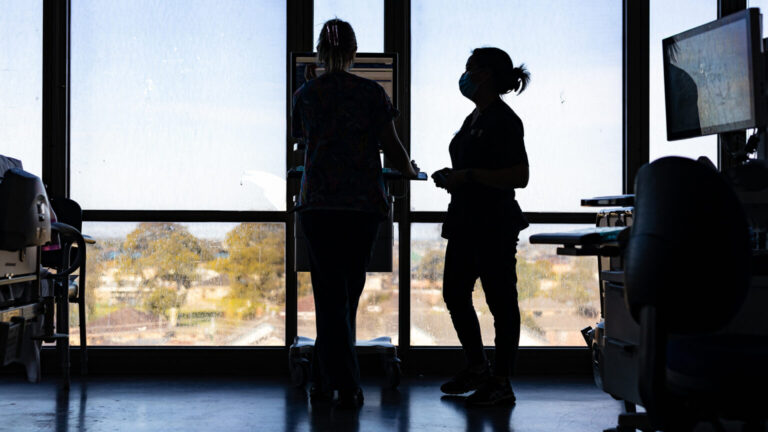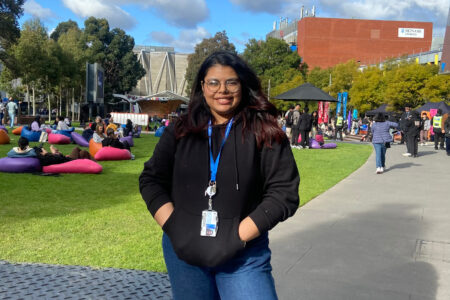
Queenie Wong always knew she was passionate about the sciences. What she never really expected was to become a nurse in Down Under and have aggressive patients threaten to punch her.
Funnily enough, Wong’s journey to Australia to become a registered nurse wasn’t a planned one.
In fact, she initially thought about studying abroad in Scotland and going on to work in a lab.
But life – or rather a sly education agent – had different plans for her.
The story begins when the then-16-year-old Malaysian finished her O-Levels, engaging with local agencies to explore potential degrees and career pathways.
She met with education agents, and one suggested Monash College and its university counterpart, Monash University, in Australia. Strangely, the agent was particularly eager with his suggestion and was quite insistent on Wong enrolling in Monash.
He spoke about how Monash’s college programme would allow graduates to continue to university under the same institute, which initially sounded appealing to Wong as she wouldn’t have to stress about her next steps.
“He talked a little about other universities as well, but it was mainly about Monash,” said Wong. “And when you’re 16 to 17… you don’t know much. I wasn’t even looking at Australia as an option but because they were heavily pushing it, I went ahead and put in the application.”
But looking back now, Wong suspects that her education agent had ulterior motives for pushing her towards joining Monash.
The motive in question? A handsome commission.

Wong is now based in Melbourne, Australia, waiting on permanent residency. Source: Queenie Wong
A rocky start to her international student journey
It wasn’t until Wong moved to Australia to study at Monash University that she learned the truth about education agents and their tactics.
“It was something I learned from another international student. They talked about education agents getting commissions when they successfully introduce students to universities,” said Wong. “Looking back, payment wasn’t required when we first worked with my agent, which further fed the idea that he was getting a commission in return. It just didn’t feel genuine because I could have looked at other universities.”
Indeed, not all education agents have students’ best interests in mind.
Some may just be in for the generous commission – universities may award education agents with a commission of up to 10% of an international student’s first-year fees. 10% may not seem like a lot at first, but the numbers steadily rack up with the more students they manage to enrol.
Determined to look on the bright side regardless, Wong believed that Monash was a good university for her.
After all, the university is an established, highly-ranked institute – Monash is among the top 100 in the world for business, marketing, health and more.
It was just unfortunate that the thought of education agents soured her initial experience, and it left her wondering if she could have done something different.
“I genuinely think Monash was one of the best universities I could get into, so the opportunity alone was great,” she said. “But my international student experience wasn’t the best.”
After completing her undergraduate studies in science, she realised that working in a lab environment did not suit her. So she chose to seek out other potential opportunities, but soon realised it was difficult as an international student.
Her hopes plummeted even further when she attended the university’s Career Day. As an international student, she was eager to seek out and network with potential employers. This, however, proved difficult when every booth was only willing to hire Australian citizens or those who already had permanent residency.
“I met with a lot of representatives that were initially helpful, but as soon as we talked about criteria, we were just met with “sorries” and “we’re only looking for PRs and citizens.” It was the biggest deterrent for me personally, and I never went to any other Career Day after that.”
Following this, and knowing that lab work just wasn’t for her, Wong pursued an intensive two-year nursing degree – Monash’s Master’s in Nursing Practice. It was a good opportunity that would provide her with a professional nursing qualification, even if she completed her undergraduate studies in a non-nursing degree.
Plus, with a global shortage of healthcare workers, being a registered one would mean that Wong would get her foot into the door of the Australian workforce.
“I do sometimes think about whether if I had gone to Scotland, which back then was my first choice, how I would go about in my career,” she admitted. “But being able to get into Monash and graduate was also no easy feat. So although I do think about the possibilities, I’m still happy with the choices I’ve made so far for my career.”

While her life as a registered nurse can be hectic, Wong is happy that she has a work-life balance, and spends her time off cooking with her partner. Source: AFP
A day in the life of a registered nurse
Now, Wong is in her second year as a registered nurse.
She currently does bank nursing, which allows her flexibility in choosing wards to work at. However, theory and research often don’t reflect actual experiences, and while her time at Monash prepared her for most of her experiences, she had to learn to navigate the industry.
“You wouldn’t know nursing until you’ve seen what it’s like in an actual day-to-day ward environment. It’s definitely different from what university professors tell you,” said Wong. “They don’t prepare you for the people you work with, the ward managers, budget cuts, and how they affect the entire healthcare industry, that’s for sure.”
If she’s on the morning shift, Wong’s days as a nurse usually start at 7 a.m. After morning handovers, she gets to work assisting patients with their breakfast if needed and performing medication rounds. She also takes patient vitals and monitors them for signs of deterioration while attending to buzzers and additional requests.
“The mornings are usually the busiest. Depending on the wards, you’ll probably see 1:4 or 1:5 nurse-to-patient ratios,” she said. “Sometimes it can even be 1:3.”
When 1 p.m. rolls around, the afternoon shift comes in, and morning nurses can catch a quick break and lunch.
If lucky, she gets to head off home around 3:30 p.m. When she’s on an afternoon shift, she works until 8 p.m., when the night nurses come in and take over. On an overnight shift, Wong says a nurse would have to attend to potentially up to 10 patients.
“It’s quite polarising, being a nurse,” Wong said. “On one hand, you could have touching moments with patients, where they express their heartfelt gratitude for the work we do. But at the same time, you could have patients threatening to harm you.”
Wong recalls a time when a patient claimed she had been promised free television, only to be told that television channels would be available only through a paid subscription for public hospitals. The patient promptly flew into a rage, shouting and cursing at Wong and her team and even threatening to punch them.
“It was very confrontational, and we were strongly encouraged to attend a session with the hospital psychologist after that.”

Wong enjoys living and working in Australia, but occasionally thinks of what life would be like if she didn’t listen to her education agent. Source: Queenie Wong
Her thoughts on education agents
We spoke to Wong about her opinion of education agents and her insights on what to look out for when engaging with one.
Do you think that education agents can greatly affect a student’s academic trajectory, especially those who push for enrolment for the sake of commissions?
In fact, I think they can greatly impact both students and parents in their decision-making process, especially when both students and parents aren’t sure in regards to what universities they should pick.
Ultimately, that’s the reason we go to agents in the first place – to get guidance.
Do you think there should be more regulation or oversight of education agents to protect students?
Yes, there should be more regulations in place, as it is only fair that parents and also students get the most accurate data or information regarding a university.
This is important as certain courses at different universities may vary, and alternate programmes, albeit the same offerings, may be more beneficial to the student’s learning.
In your opinion, what red flags should prospective students look out for when dealing with education agents?
One thing to look out for is knowing what universities they are pushing. If they are pushing for just one particular university, I think that’s a really good point to keep an eye on.










